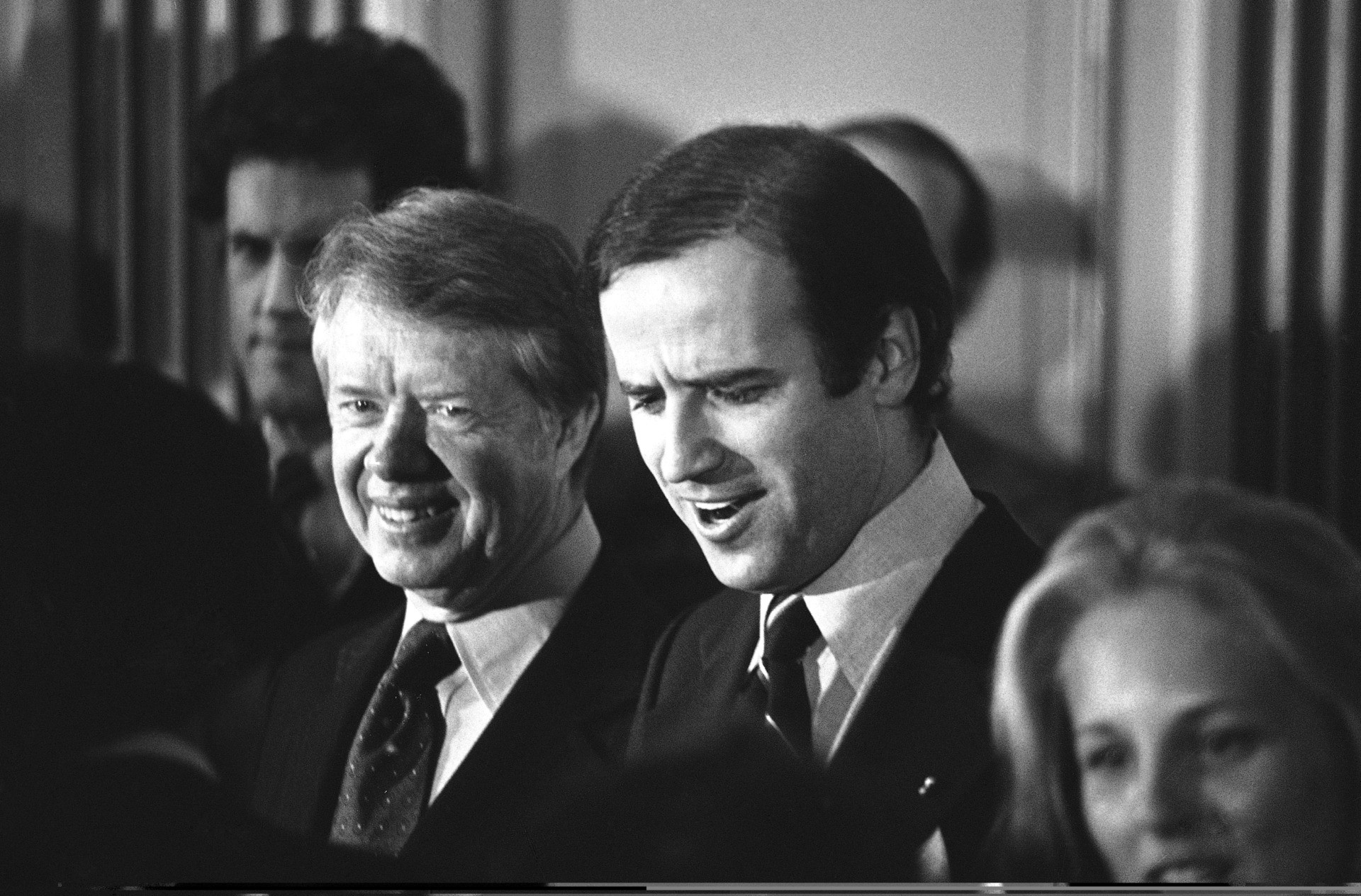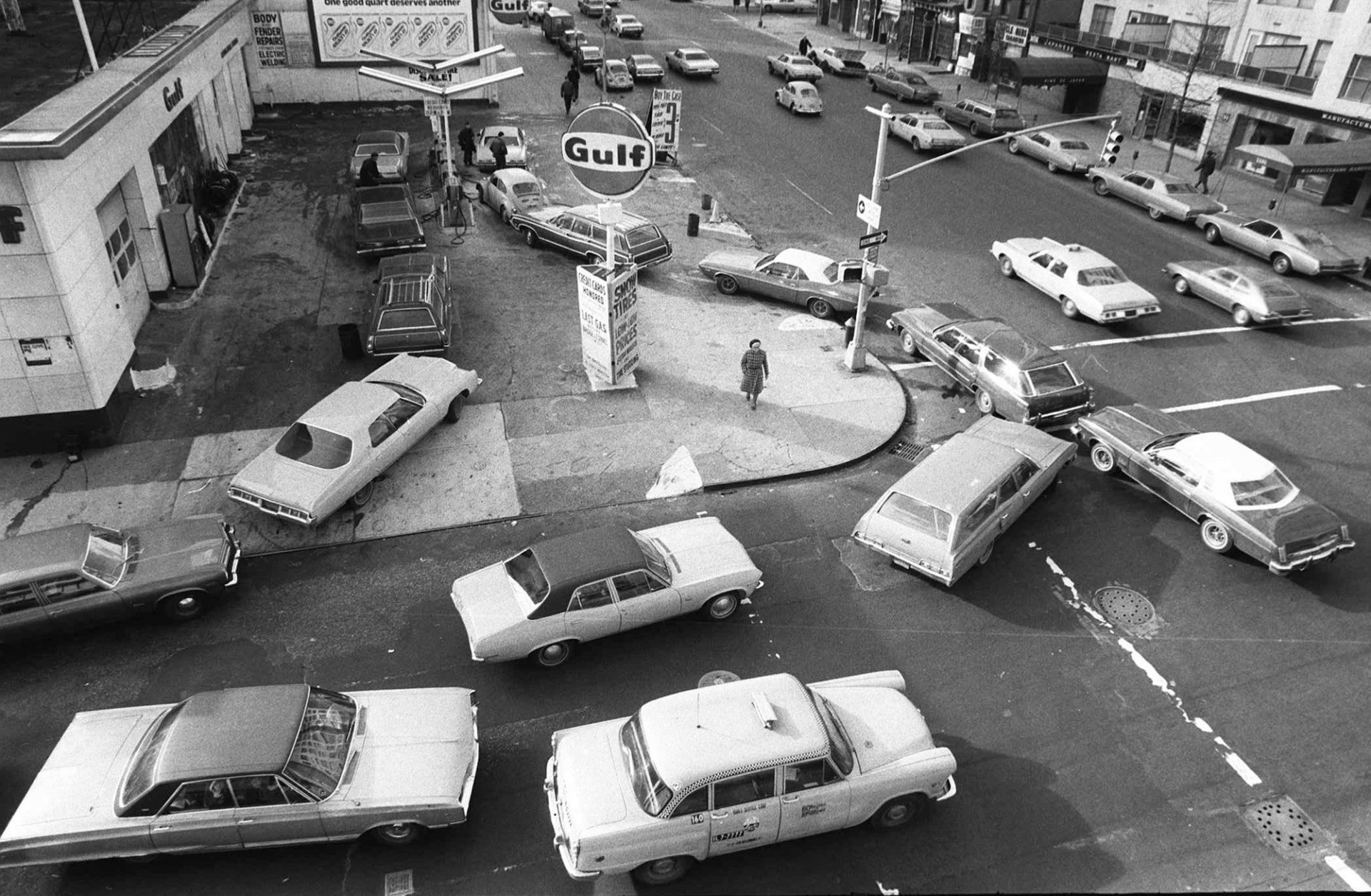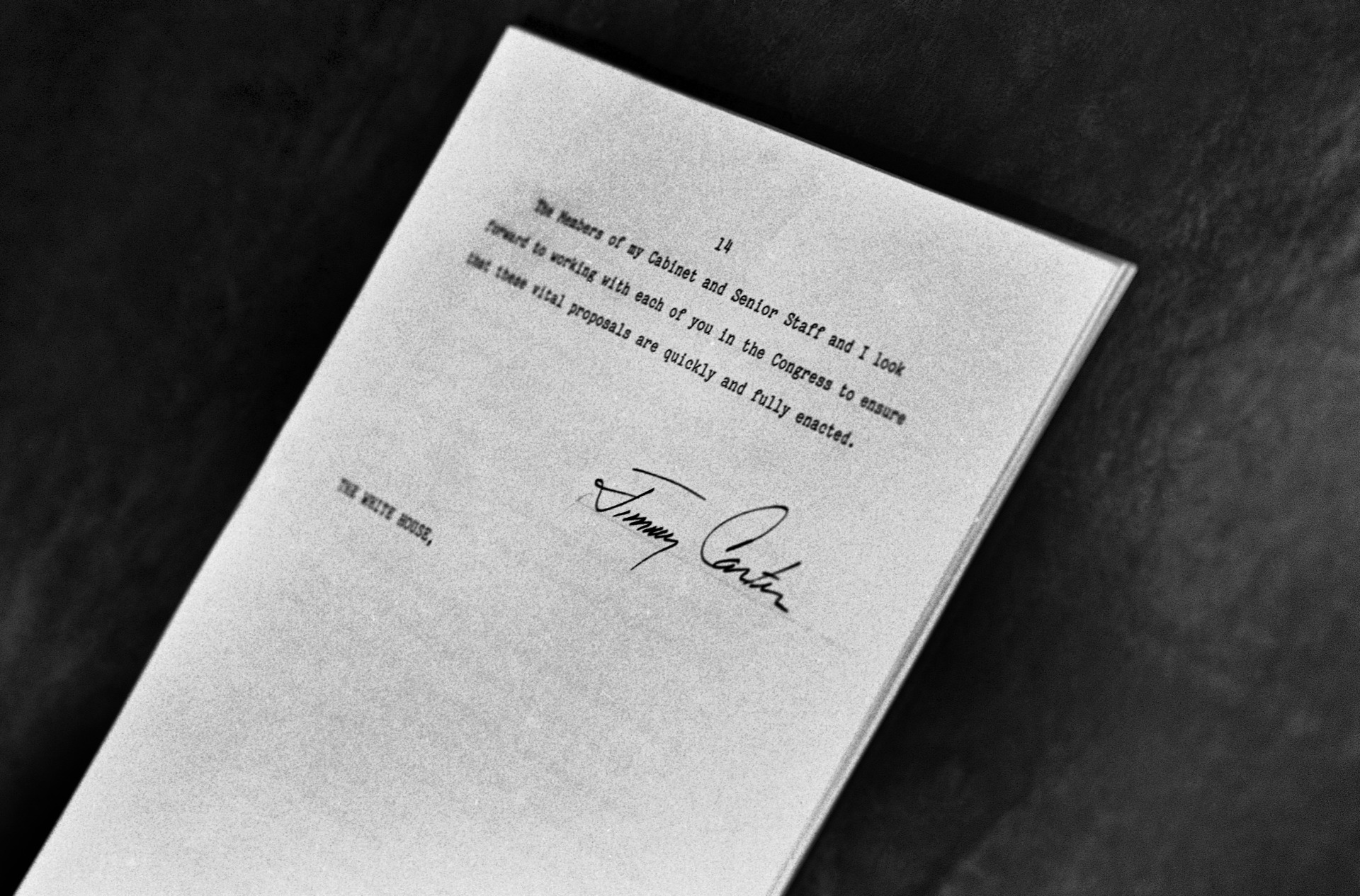Pinkerton: Carter 2.0 — Biden Blames Others for His Own Energy Failures
Joe Biden is the gift that keeps on giving. The gift, that is, of parallels with fellow Democrat Jimmy Carter.
Most Americans have no memories of the actual Carter presidency, from 1977 to 1981, but this Baby Boomer sure does. As for you youngins, you can can look him up, and you’ll see too: He was terrible in office. So terrible, in fact, that when he ran for re-election in 1980, he was thunderously defeated, losing to Ronald Reagan by almost ten points in the popular vote and by 489 to 49 in the electoral college.
Yes, Carter was that bad.
So it might seem strange that Biden seems to have chosen Carter as a role model. He is replicating, for instance, Carter’s policies on regulatory contraction and, at the same time, price inflation. Yes, it’s a strange emulation, and yet here we are in the early 2020s, replaying the late 1970s.
Here at Breitbart News, we’ve made something of a specialty of comparing the 46th president to the 39th president—just type in “Joe Biden Jimmy Carter” in the search box and you’ll get dozens of pieces, including seven by yours truly.
And now, here’s an eighth article from me, inspired by this November 17 headline in The New York Times: “As Gas Prices Surge, Biden Asks F.T.C. to Investigate ‘Illegal Conduct’” As the Times reported:
President Biden asked the Federal Trade Commission on Wednesday to consider whether “illegal conduct” by large oil and gas companies is pushing up gasoline prices for American consumers, the latest effort by the administration to target concentration in the energy industry in a bid to bring down prices at the pump.
That’s a loaded phrase, “illegal conduct.” So now Biden is applying the same sort of demagogic judge-in-advance tactic that he applied to his own federal border patrol agents in Texas, or to Kyle Rittenhouse in Wisconsin. He’s telling telling Federal Trade Commission (FTC) chair Lina Khan that he sees “mounting evidence of anti-consumer behavior by oil and gas companies.” In the world of the FTC, these are potential crimes that Biden is alleging.

President Jimmy Carter and Sen. Joe Biden greet Biden supporters at a $1,000-a-couple fund raising reception in Wilmington, Delaware, on Feb. 20, 1978. Biden was the first U.S. senator to endorse Carter’s presidential candidacy in 1976. (AP Photo)
There’s no doubt that gasoline prices have risen sharply in the last year by more than a dollar a gallon. And yet there’s also no doubt that the Biden administration is the chief culprit. How? By constricting supply. That might not be a legal crime, but it’s certainly a financial crime against the American consumer.
As The Wall Street Journal observed on October 21, “For nine months President Biden has been pursuing policies to squeeze oil-and-gas producers to limit production and eventually go out of business.” The Journal continued:
His first day in office, Mr. Biden revoked the permit for the Keystone XL pipeline, which was supposed to carry oil from Canada and the Bakken Shale to refineries on the Gulf Coast. A week later he issued an order placing a moratorium on new oil-and-gas leases on federal lands and waters.
As the article details, there’s much more, from additional shutdowns of pipelines to more moratoriums on drilling to new and burdensome regulations on production. And we should add that Biden has nominated one Saule Omarova, a hard-left academic—who boasts, no kidding, a degree from Moscow State University in Russia, where, in the days of the Soviet Union, she wrote an admiring thesis on Karl Marx—to be the U.S. Comptroller of the Currency. From that position overseeing banks, Omarova would have the power to restrict and perhaps choke off financing for energy companies. And Omarova looks forward to using that dead-hand power, saying recently, “We want them to go bankrupt if we want to tackle climate change.”
C-SPAN
In the meantime, Omarova’s political sponsor, Sen. Elizabeth Warren (D-MA), is happy to herself reinforce Biden’s demagoguery; appearing on MSNBC, she said of high gas prices, “This isn’t about inflation. This is about price gouging for these guys & we need to call them out.” We can quickly see: Whether or not Biden persuades the FTC to “do something” about gas prices, Warren-type Democrats will make heir own effort on Capitol Hill, and perhaps also in the states. Such activism won’t produce more energy, of course, and yet it might produce some good left-wing headlines.
Prices at the pump have gone up. Why? Because giant oil companies like @Chevron and @ExxonMobil enjoy doubling their profits. This isn’t about inflation. This is about price gouging for these guys & we need to call them out. pic.twitter.com/kxiQkC2tYa
— Elizabeth Warren (@SenWarren) November 20, 2021
Still, given all this neo-Bolshevik green zealotry, it’s easy to see why the supply of energy is not meeting the demand for energy—especially as Biden pumps ever more money into the economy, through inflationary fiscal and monetary polices. It’s simple: Less supply + more demand = higher prices.
Biden should know how this process—both recessionary and inflationary at the same time—works out for Americans. After all, he was first elected to the U.S. Senate in 1972, and thus had a ringside seat in Washington, D.C., during the Carter presidency. In its first few years, that administration, too, simultaneously constricted energy supply and expanded monetary demand. The result, of course, was stagflation—the worst of stagnation and of inflation.
But perhaps Biden doesn’t remember this history anymore. So let’s recollect it for him.
Flashback to Carter 1.0
Jimmy Carter came into office on January 20, 1977 convinced that American energy producers—including, but not limited to, the big oil companies—were the problem. Specifically, the new president was convinced that producers were wrongfully withholding supply, thereby undermining support for his grand governmental energy plan.
It was a strange for Carter to think that bureaucrats were the solution, since it was an American entrepreneur, Edwin Drake, who had launched the oil industry when he struck black gold in Titusville, Pennsylvania, back in 1859. Indeed, entrepreneurs, and later tycoons, had made America the planet’s leading oil producer throughout the 19th and most of the 20th century.
In fact, U.S. oil production only started to falter in 1971, when President Richard Nixon imposed price controls on oil as part of an overall strategy of combatting inflation with regulation and red tape—an effort that was not a success.
The predictable result of those price controls was that U.S. energy production, which had been rising for more than twelve decades, began to decline.

In this Dec. 23, 1973, photo, cars line up in two directions at a gas station in New York City. Of all the bad memories seared into the American consciousness from the early 1970s, the never-ending lines at the gas pump has to top the list. (AP Photo/Marty Lederhandler)
This was the situation that Jimmy Carter inherited when he took office in 1977. Puzzled over the decline—the basic laws of supply and demand did not compute in his brain—Carter blamed the oil companies for not producing more energy. He further grudged them for not supporting his grandiose legislation, which called for everything from government-sponsored synthetic fuels and solar power to federal mandates on the energy efficiency of automobiles and even home appliances.
Carter’s dogged view was that Washington, D.C., was better at making energy decisions than actual energy producers in, say, Houston or Tulsa—and if the industry didn’t agree, well, then it should be investigated, even demagogued. (Never mind that, as Breitbart News’ John Carney has documented, the ratio of prices at the pump to prices further up the supply chain has not changed–which is to say, there’s been no sudden gouging.)
Yet every opportunistic politician needs someone other than himself to blame, and Biden, a survivor these past five decades, is nothing if not an opportunist, and so now he’s attacking the energy companies. And here’s where Carter neatly anticipated, by almost exactly 44 years, Biden’s just-sent letter to the FTC. In a White House press conference on October 13, 1977, Carter accused oil companies of “the biggest rip-off in history.” He raged on at Exxon and others for a while longer, leaving The New York Times to report that Carter’s venom against the oil companies was also linked to his anger at fellow Democrats in Congress, who were not jumping to pass his energy bill:
Although he has spoken strongly before about the oil lobby’s role in the legislative process, Mr. Carter’s language today was the roughest he has used in the 38 weeks of his Presidency. It signaled the beginning of a White House offensive aimed at salvaging some of the energy proposals the Senate has either blocked or eviscerated in the last few weeks after the House largely adopted the Administration program.
Hmm. A Democratic president having trouble getting his too-ambitious legislation through a Democratic Congress—does any of that echo down to the president day?

A copy of the final page of President Jimmy Carters message to Congress in Washington, on April 26, 1979, asking for passage of a windfall tax on profits by oil companies. (AP Photo/Barry Thumma)
Stepping back, we can see that Carter and Biden have had something in common: a faith that their government-centric policies are best. And with that faith comes a curt dismissal of others’ ideas about energy, whether they come from Democrats (such as Sen. Robert Byrd of West Virginia in Carter’s day, or Sen. Joe Manchin, who now holds Byrd’s seat) or from Republicans.
The result of such presidential myopia is predictable. Like Mr. Magoo, the near-blind cartoon character, Mr. Carter, then, and Mr. Biden, now, stumble around unaware, until finally tumbling into a trap. That trap, of course, is less energy supply, combined with higher energy prices. Which is exactly what we suffered from in the Carter era and what we are suffering from again now in Biden times.
Given his mindset, there’s little chance that Biden will notice when lifelines are thrown in his direction. Interestingly, one of those lifelines is coming from the very energy companies that Biden wishes to see investigated, and perhaps prosecuted.
On November 16, Vicki Hollub, CEO of Occidental Petroleum, volunteered that her company could produce more energy, if it were allowed. Speaking to CNBC, Hollub wondered aloud why Biden was asking the Arab-dominated OPEC oil cartel to produce more so that we could import more, while at the same time, he was restricting America’s ability to produce more. As Hollub put it, “If I were gonna make a call, it wouldn’t be long distance, it would be a local call.” She added, “And I think that we could do it more cheaply in the United States.”
The White House
For reasons having to do with classic-demagogic Democratic politics, combined with the newer green hostility to carbon fuels, Biden doesn’t want to get too close to American oil companies—not even if they can help him. That’s his loss, although, of course, it’s our loss too for as long as he’s president. (And so some survival-minded Democrats in Congress are now distancing themselves from him on the energy issue; one such is Rep. Abigail Spanberger of Virginia, who puts the blame on Biden, not Big Oil: “There’s a variety of contributing impacts, but certainly the buck stops with the President.”)
Rep. Spanberger on the increasing cost of gas: “There’s a variety of contributing impacts, but certainly the buck stops with the President.” pic.twitter.com/rXjMbIII5P
— America Rising (@AmericaRising) November 24, 2021
Interestingly, Biden is now tapping the Strategic Petroleum Reserve (SPR) as a way of bringing more oil to the market. (Yes, this appears to be a repudiation of the greens’ favored strategy of raising prices to shrink consumption, but that’s a tale of Biden’s last-ditch desperation that can be told another time.) The SPR is an idea from the 70s; it was first filled, in fact, during the Carter administration.
And while tapping the SPR is not necessarily a bad idea, we can step back and see: Biden, like Carter before him, would rather play shell-games with limited reserves, already pumped and in storage, than do anything that would genuinely increase long-term supply–namely, more energy exploration and production. The real SPR is not some stash of oil controlled by bureaucrats, but rather, the reserves of energy all across the United States waiting to be drilled and mined. And yet it’s that overall energy capacity that Biden, as with Carter before him, has worked so hard to cripple.
This is a point made well by Sen. Bill Cassidy (R-LA); we need less bureaucratic fiddling and more actual producing:
The best way to lower gas prices is to continually invest in the U.S. energy industry so we don’t have to import energy from other countries when there is a supply shortage. Americans need long-term solutions to skyrocketing gas prices, not a band-aid fix.
Thus it’s highly unlikely that Biden will heed the words of North Dakota’s Republican Gov. Doug Burgum, who is also calling for more U.S. production:
We urge President Biden to work with North Dakota and other oil-producing states to continue to grow our domestic oil supply now, rather than taking it from future generations or buying it from foreign sources.
We urge President Biden to work with North Dakota and other oil-producing states to continue to grow our domestic oil supply now, rather than taking it from future generations or buying it from foreign sources. 3/3
— Gov. Doug Burgum (@DougBurgum) November 23, 2021
And across the partisan aisle, Sen. Joe Manchin (D-WV) was similarly caustic in his commentary on Biden’s SPR maneuverings.
Perhaps Biden is so enamored with Carter that he has buried the memory of what happened to his like-minded predecessor after just four years in office: He lost in a landslide to Reagan. We might further recall that the new 40th president, in one of his first acts of office, abolished those counter-productive energy price controls, thus freeing up supply and ushering in the great economic boom of the 1980s.
Or maybe Biden has simply forgotten this history. So now it’s up to us to remember it.





Comments are closed.